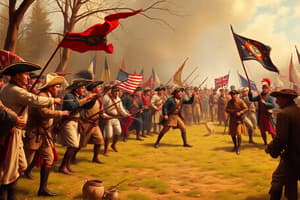Podcast
Questions and Answers
What was the cause of the French and Indian War?
What was the cause of the French and Indian War?
The cause of the French and Indian War was triggered by Britain and France wanting power of North America. Both desired control over the Ohio Valley.
What led up to the war?
What led up to the war?
The French governor sent people to the Ohio River to engrave plates indicating the land belonged to France, while Virginian fur trader Christopher Gist searched for a settlement location.
Why did most Indian tribes side with the French over the English?
Why did most Indian tribes side with the French over the English?
Many Native Americans sided with the French because the French were trappers and traders who respected the Indians and did not destroy their hunting grounds.
Who owned the Ohio Valley first?
Who owned the Ohio Valley first?
Who were among the allies of the French?
Who were among the allies of the French?
Who was Joseph Brant?
Who was Joseph Brant?
Who were the allies of the English?
Who were the allies of the English?
What happened to young George Washington in his first military engagement at the age of 22?
What happened to young George Washington in his first military engagement at the age of 22?
Where did the representatives from the seven colonies meet to discuss the Albany Plan of Union?
Where did the representatives from the seven colonies meet to discuss the Albany Plan of Union?
What was included in the proposal of the Albany Plan of Union?
What was included in the proposal of the Albany Plan of Union?
What did the Albany Plan of Union take care of?
What did the Albany Plan of Union take care of?
What would be good about having one general government for the whole 13 colonies?
What would be good about having one general government for the whole 13 colonies?
What did the colonial assemblies think of the Albany Plan of Union?
What did the colonial assemblies think of the Albany Plan of Union?
In this conflict, what were the advantages of the French? (Select all that apply)
In this conflict, what were the advantages of the French? (Select all that apply)
In this conflict, what were the advantages of the English? (Select all that apply)
In this conflict, what were the advantages of the English? (Select all that apply)
What were the consequences of the Treaty of Paris?
What were the consequences of the Treaty of Paris?
Who was William Pitt?
Who was William Pitt?
What did James Wolfe do?
What did James Wolfe do?
Why was Quebec important to the French?
Why was Quebec important to the French?
Where did the French supply their forts?
Where did the French supply their forts?
Who was Edward Braddock?
Who was Edward Braddock?
Flashcards are hidden until you start studying
Study Notes
Causes of the French and Indian War
- Competition for power in North America drove both Britain and France to conflict, specifically control over the Ohio Valley.
Prelude to War
- The French governor marked territories in the Ohio Valley as belonging to France, escalating tensions.
- Virginia fur trader Christopher Gist, sent by the Ohio Company, chose a settlement site at the confluence of the Ohio and Allegheny rivers.
- Conflict arose from overlapping territorial claims, leading to confrontations between the two powers.
Native American Alliances
- Native American tribes faced a choice between supporting the French or English, with many siding with the French.
- The French's non-invasive practices towards land and respect for tribal cultures attracted Native American allies; they primarily engaged in trapping and trade rather than farming.
Historical Claims
- The French were the original sovereigns of the Ohio Valley before British encroachment.
Key Native American Groups
- The Hurons were significant allies of the French, acting as intermediaries with other tribes.
- The Iroquois were crucial allies for the English, competing against the Hurons and Algonquins.
George Washington's Early Career
- Young George Washington, at age 22, undertook a critical mission to warn against French encroachment, successfully delivering the message and earning a promotion to colonel.
Albany Plan of Union
- Representatives from seven colonies gathered in Albany, New York, to discuss forming a united government for the 13 colonies.
- The proposal aimed to manage collective issues such as defense, taxes, and legislative authority.
Colonial Reactions to Albany Plan
- Although the concept was supported, none of the colonial assemblies approved it due to reluctance in relinquishing power to a central authority.
Strategic Advantages in the War
- The French enjoyed advantages such as a unified government enabling rapid mobilization, a greater number of Native American allies, and a respectful approach to Indian treaties.
- The English boasted larger colonial populations and a more manageable defensive position due to the geographic distribution of their settlements.
Treaty of Paris Consequences
- The Treaty of Paris ended French dominance in North America, granting Britain control over Canada and all French territory east of the Mississippi River, ushering in an era of peace.
Leadership and Military Strategies
- William Pitt became the head of the British government in 1757, known for his bold leadership that helped secure victories, including the fall of Quebec.
- James Wolfe was dispatched to capture Quebec, a strategic stronghold for the French, crucial for their defense.
Importance of Quebec
- Quebec was critical for the French military supply chain, vital for supporting forts along the St. Lawrence River.
Edward Braddock
- Braddock was a key British general involved in early military efforts during the conflict, though his specific actions in this context were not fully detailed.
Studying That Suits You
Use AI to generate personalized quizzes and flashcards to suit your learning preferences.




